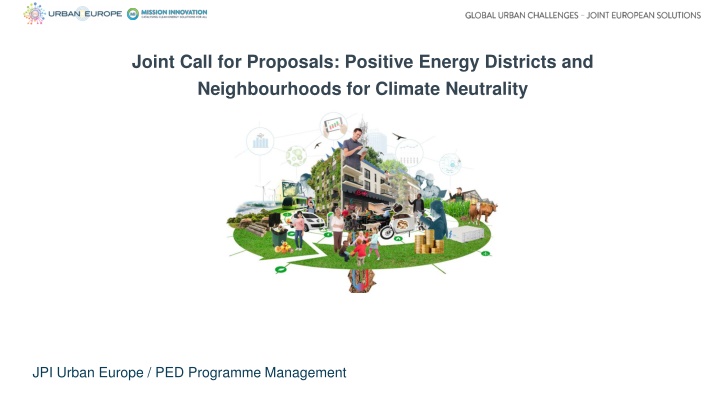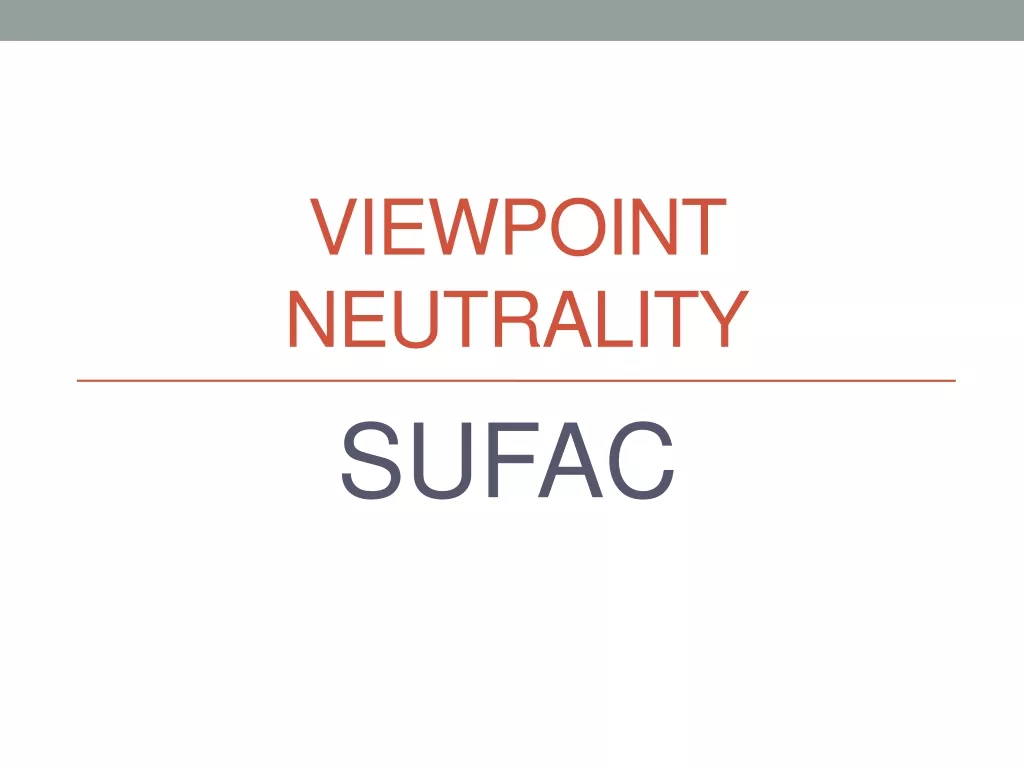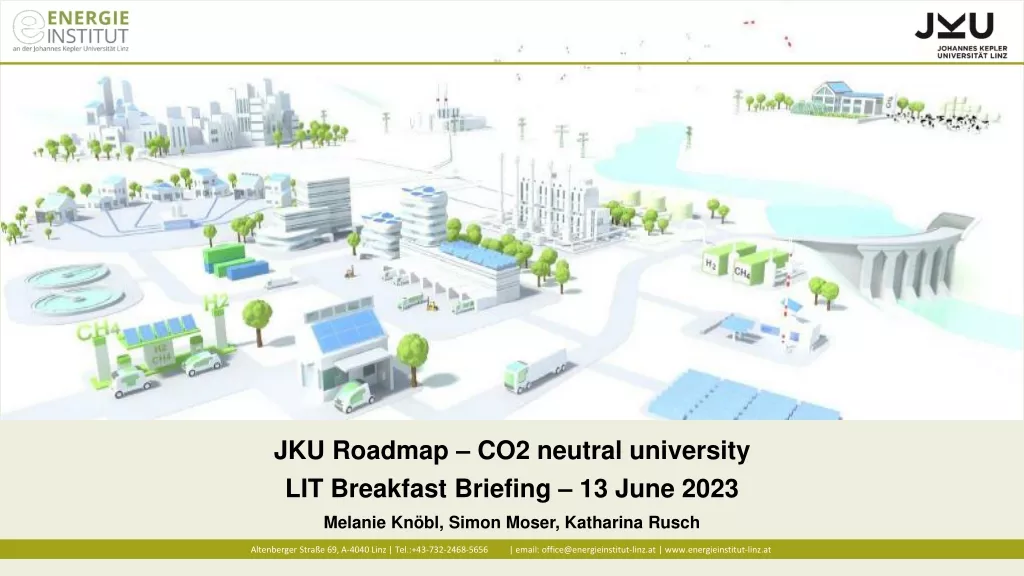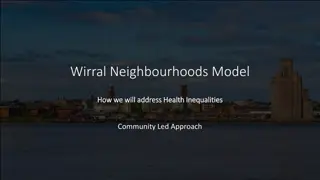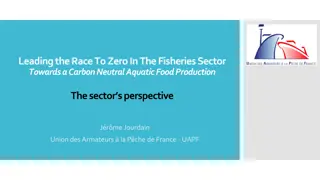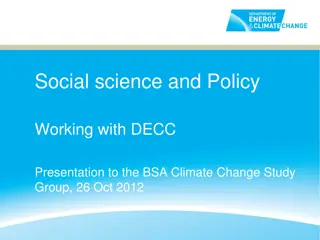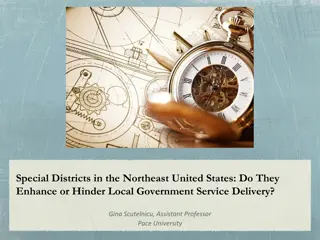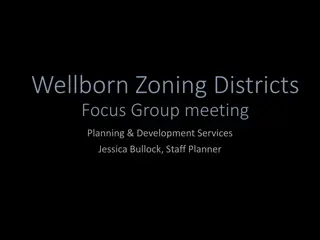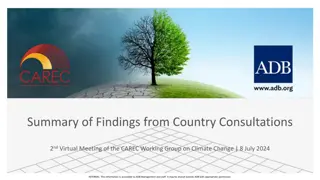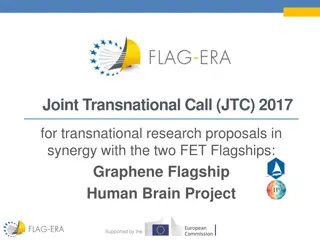Joint Call for Proposals - Positive Energy Districts and Neighbourhoods for Climate Neutrality
This joint call for proposals, facilitated by JPI Urban Europe, focuses on developing Positive Energy Districts and Neighbourhoods to address climate neutrality goals. The initiative aims to enhance knowledge and support large-scale implementation by 2025, aligning with Horizon Europe's mission for climate-neutral and smart cities by 2030. The call invites joint R&I projects that transform existing urban areas towards climate neutrality through innovative retrofitting strategies and sustainable development approaches.
Download Presentation

Please find below an Image/Link to download the presentation.
The content on the website is provided AS IS for your information and personal use only. It may not be sold, licensed, or shared on other websites without obtaining consent from the author.If you encounter any issues during the download, it is possible that the publisher has removed the file from their server.
You are allowed to download the files provided on this website for personal or commercial use, subject to the condition that they are used lawfully. All files are the property of their respective owners.
The content on the website is provided AS IS for your information and personal use only. It may not be sold, licensed, or shared on other websites without obtaining consent from the author.
E N D
Presentation Transcript
Joint Call for Proposals: Positive Energy Districts and Neighbourhoods for Climate Neutrality JPI Urban Europe / PED Programme Management
Overview Established by JPI Urban Europe Call budget EUR 7.85 million Countries 8
Timeline Funding recommendation by the Steering Committee Earliest expected start of the projects Mid-term meeting Call opening Eligibility Check 24 Feb. 2022, 12:00 May 2022 June 2022 2022 2023 2024 2025 20 Oct. 2021 Feb. 2022 June 2022 July 2022 2023 2024 National funding decisions and announcement of results to Main Applicants Meeting of Expert Panel to assess proposals Proposal deadline: February 24th 2022, 12:00 CET Final Projects Event Kick-off meeting
About the call Second call in the PED Programme facilitated by JPI Urban Europe. The call focuses on joint R&I projects (duration 2-3 years) that address at least one of the two topics. As an integral part of comprehensive sustainable urbanisation strategies, establishing Positive Energy Districts and Neighbourhoods shifts the focus from the individual positive energy building towards neighbourhoods and thus a new level of impact on sustainable urban development and the energy transition process. Continues to create a transdisciplinary and cross-sectoral community working in the field of the energy transition in the urban context, aiming for high stakeholder involvement, collaboration and co-production of knowledge.
Aims of the Call enhance theoretical and practical knowledge for PED development in terms of both technological innovation and process innovation, support the strategic development of key areas of action for PED development as defined within the PED Programme , facilitate the achievement of the PED Programme Mission of large-scale implementation of 100 PEDs by 2025, develop PEDs as building stones for the Horizon Europe Mission on Climate- neutral and Smart Cities to implement 100 climate-neutral cities by 2030.
Call topics Topic 1: PEDs towards climate neutrality: transforming existing urban neighbourhoods With the formulation of the European Green Deal and the Mission on Climate-Neutral and Smart Cities under the Horizon Europe framework programme, the European Commission has set ambitious goals regarding climate change adaptation and the energy transition. This call on Positive Energy Districts and Neighbourhoods for Climate Neutrality aims at aligning PED development with these ambitions and fostering PED development as a key building block towards climate neutrality. For European urban areas this implies a strong focus on existing urban structures and therefore innovative retrofitting and re-design strategies towards Positive Energy districts and climate-neutral neighbourhoods.
Call topics Topic 2: Making PEDs happen: process innovation and business models This topic focuses on the process innovation and economic feasibility for PED development. It aims at developing strategies for stakeholder cooperation, business models, public-private partnership and regulatory framework under the primate of environmental, social and economic sustainability.
Types of research and innovation supported The call is open for proposals referring to a broad range of project types, from applied research to demonstration. Projects must address either applied research or innovation / implementation or both. Applied research: includes proof of concept, research to proof feasibility and small scale prototypes. The European Commission defines this research type as industrial research, meaning planned research or critical investigation aimed at the acquisition of new knowledge and skills for developing new products, processes or services or for bringing about a significant improvement in existing products, processes or services. Comprises the creation of components parts of complex systems May include the construction of prototypes in a laboratory environment or in an environment with simulated interfaces to existing systems as well as of pilot lines Innovation / Implementation: includes prototype testing in real environment, demonstration in real environment and system integration. The European Commission defines this research type as experimental development: meaning acquiring, combining, shaping and using existing scientific, technological, business and other relevant knowledge and skills with the aim of developing new or improved products, processes or services. This may also include activities aiming at the conceptual definition, planning and documentation of new products, processes or services. May comprise prototyping, demonstrating, piloting, testing and validation of new or improved products, processes or services. This may include the development of a commercially usable prototype or pilot which is necessarily the final commercial product and which is too expensive to produce for it to be used only for demonstration and validation purposes.
Types of projects The call aims at funding projects that: enhance theoretical and practical knowledge for PED development in terms of both technological innovation and process innovation, support the strategic development of key areas of action for PED development as defined within the PED Programme , facilitate the achievement of the PED Programme Mission of large-scale implementation of 100 PEDs by 2025, develop PEDs as building stones for the Horizon Europe Mission on Climate-neutral and Smart Cities to implement 100 climate-neutral cities by 2030.
Who can apply? Cities, municipalities, regions Consumers (e.g. business Companies (from industry/large companies to SMEs)* Citizens representatives, NGOs Research organisations enterprises, test households, etc.) * especially public utility companies (e.g. in the field of energy supply, other communal supply and disposal systems, ); energy service providers; real estate developers, investors, facility management providers; actors from the fields of energy, spatial and transport planning Consortium as a whole must include At least two eligible applicants from at least two of the different countries participating in the call. At least one city, municipality or entity providing key urban services for a city as an applicant (either main or co-applicant) or as co-operation partners. Consortia may consist of partners active across several positions within the research and development system (i.e. applied research, innovation/implementation) and across disciplines (natural sciences, economic and social sciences, humanities, and engineering).
Participating countries and partners Country/ region Funding agency Austria FFG Brussels-Capital Region Innoviris Denmark Innofund Netherlands RVO Italy MUR Romania UEFISCDI Sweden SWEA Turkey T BITAK
Become a member of the JPI Urban Europe Community Network access Researchers Practitioners Stakeholders Experts in urban development Etc. Programme activities Programme seminars Dissemination of results A central programme website Etc.
Upcoming call activities Information webinar for applicants 9 November 13.30-15.00 CET, online Matchmaking webinar 24 November 13.30 CET, online LinkedIn group For self-organised matchmaking and networking
More information Call Secretariat Paul Kuttner Austrian Research Promotion Agency (FFG) paul.kuttner@ffg.at Johannes Bockstefl Austrian Research Promotion Agency (FFG) johannes.bockstefl@ffg.at Communication and dissemination Amanda Ritzman, Communication Officer, JPI Urban Europe amanda.ritzman@iqs.se Contact your national agency for further information List of national contact points
